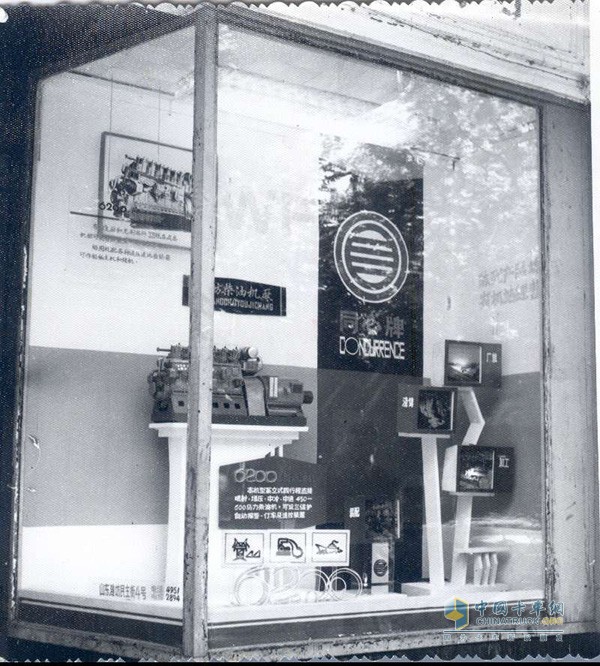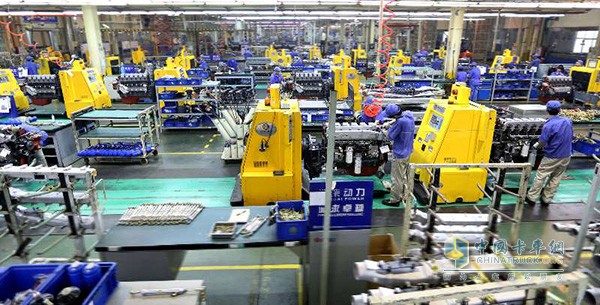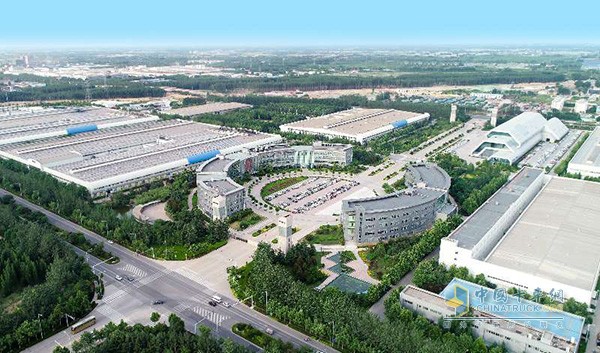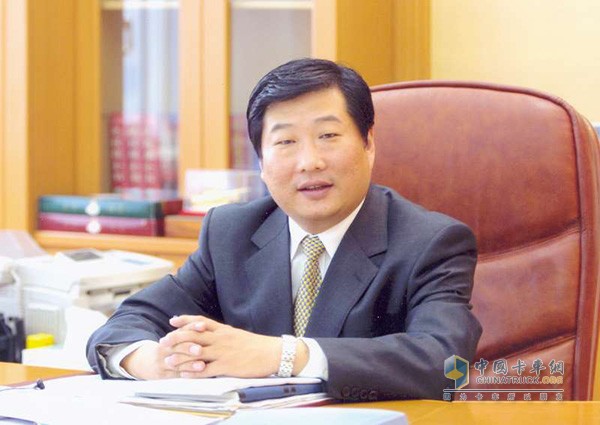In Shandong, an entrepreneur led an old state-owned enterprise with a history of 72 years and developed a unique innovative development path, becoming a successful practitioner of the integration of Chinese state-owned enterprises and the market economy. He is known as the "Tan Bold" in China's auto industry - Tan Xuguang, chairman of Weichai Group.
In the 20 years he took over the Weichai Group, the company has realized a total profit of 65 billion yuan and a domestic contribution of 30 billion yuan, creating a “increasing speed†of sales revenue growth of 380 times and annual compound growth rate of 37%. "Wei Chai Miracle."
Perceive the "spring breeze" and fight overseas
In March 1978, the National Science Conference was held in the time of the recovery of all things, and China ushered in the spring of science. At this landmark technology event, the 8V160 tank engine developed by Weichai was awarded. As one of the national key projects, the development of the 8V160 tank engine shoulders the expectations and hopes of countless people. The first work of Tan Xuguang entering Weichai is to participate in the 8V160 project.
 Engine developed by Weichai
Engine developed by Weichai
Many years later, Tan Xuguang will still recall that in 1977 he walked into the Weifang Diesel Engine Factory with his yellow bag and saw the scene of the 8V160 tank engine. Because the parents are all firewood workers, Tan Xuguang has a special feeling for the diesel engine. He knows that these powers are shouldering their respective missions, or rushing to the sea, or arranging thousands of acres of farmland, or defending the country... In the early days of Chinese industry, every engine seemed so precious.
Tan Xuguang, who just entered the factory, is not yet 17 years old. He is the youngest in the team, but he is the hardest working. His ideas are very simple: the most stupid way to learn is to be willing, and the most intelligent people are willing to do. "When a worker's 10 years is a rare opportunity in my life, during this time I systematically learned the knowledge of diesel engines and benefited my later career."
Along with the spring breeze of reform and opening up, Tan Xu was stunned by the light: a new era has arrived. When many young people around him have not yet awakened from the "struggle" because of the "Cultural Revolution", he resolutely chose to learn to charge. What is the use of others to ask him to learn mechanical drawing and political economy? He does not justify reading. At that time, Tan Xuguang spent every day busy, going to work during the day, studying at the Central Radio and Television University at night, and graduating with the first place in the class.
In 1987, Tan Xuguang took the initiative to transfer to the Foreign Trade Section of Weichai Gang as a salesman. In 1991, he led the maintenance service team in Indonesia and established the first overseas service station of Weichai. Every day, he took the map with the sun and traveled through Indonesia's large and small islands to negotiate with local agents to provide services to customers. "I have been to the most desolate island, I have drilled through the deepest cabins, and I have done all the hard work." Under his efforts, the local business volume increased by 10 times in the first year. Overseas experience, let Tan Xuguang first taste the sour and bitterness of the market economy, and let him know that the degree of openness of the country determines the breadth and depth of the development of the enterprise.
Following the pace of the country's opening to the outside world, Tan Xuguang is a fisherman in overseas markets. At the age of 31, he became the general manager of Weichai Import and Export Corporation. Under his leadership, the total export value of Weichai has increased from 300,000 US dollars to 60 million US dollars, becoming a banner for the export of foreign machinery in the national machinery industry.
"State-owned entrepreneurs" growing up on the tip of the knife
Under the planned economic system, state-owned enterprises are production units that implement government planning directives, and they have no right to operate independently. Production and social needs are seriously out of touch. In 1978, state-owned enterprises launched a reform journey of “decentralization and profit-makingâ€. By the mid-1990s, although the state-owned enterprises had achieved obvious development, the contract system of “one package for the spirit†had many drawbacks. The problems of overcapacity and falling profits eroded state-owned enterprises. According to incomplete statistics, state-owned enterprises that suffered losses in the first half of 1996 reached 43.3%, and even in the first quarter of 1998, there were even large-scale national losses.
In the tumbling market economy, Weichai failed to be independent. In 1997, the total output value of Weichai industry dropped from 850 million yuan at the peak to 590 million yuan; the sales volume of 6160 diesel engines, the main product of the company, plummeted from 1,530 to 1,257. In 1998, the business performance continued to deteriorate, becoming the most difficult enterprise in Weifang, Shandong Province. The internal and external debts amounted to 360 million yuan. Even normal production could not be guaranteed, and the company went to the brink of bankruptcy.
On June 19, 1998, 37-year-old Tan Xuguang was appointed as the director of Weifang Diesel Engine Factory. Tan Xuguang did not have much joy. He felt the pressure: the factory mechanism was rigid, the brain was lost, the burden was heavy, the business was huge, the technology was backward, and the products were slow.
After Tan Xuguang took office, the first fire led to the leadership team. In his inaugural speech, he put forward the "three chapters of the law": adhere to the principle, dare to grasp the rules, do not be good old people, not "foreign officials"; put down the body, really work hard, do practical things for the enterprise, do good things for the employees; lead by example, clean and honest We ask employees to do it. We must do it first, and we must not allow employees to do it. We will not do it. The "Three Chapters of the Law" revitalized the morale of the leading cadres and the confidence of the employees, and became the foundation of the founding of Weichai, which always constrained, motivated and united every manager. In the past 20 years, no one of the core members of the leadership team of Weichai has left, no one has an accident, and no family has gone wrong, which has made a good story in the industry.
In the past, the cadres of state-owned enterprises were ranked seniorly, and the income of employees was entirely dependent on the length of service and the age of the workers. The enthusiasm was very poor. The heads of state-owned enterprises are faced with a common problem - how to lead enterprise workers out of the hotbed of planned economy. To adapt to the ever-changing market situation, we must first change ourselves and establish a fully adaptive and market-oriented mechanism from within. Tan Xuguang quickly aimed at the disadvantages of the internal mechanism. He first conducted a survey of the company. Despite knowing that the situation was worrying, I was shocked when I got the results. There are 53 directly affiliated units of Weichai, with a total of 13,600 people, including 182 departments, 4,400 support personnel, 1,550 management personnel, more than 750 leading cadres at the department level and above, and only 3,656 first-line production workers. A professional factory of 300 people, with as many as 40 or 50 managers. "3 people live for 3 people, and 5 people for 3 people eat".
Tan Xuguang decided to launch the "three-set" reform (fixed, fixed, and fixed), and streamlined the organization and the abolition of redundant staff as the first step of reform. In this hard-hitting reform, the number of units directly under Weichai has been reduced from 53 to 10, the number of cadres has been reduced from 750 to 235, and the total number of employees in the post has been reduced from 13,600 to 8,000. Tan Xuguang likened this measure to “demolition of the templeâ€: the temple is not dismantled, and God will not leave.
What really made Weichai out of the predicament was the 2002 "three-three system" property rights reform. This reform plan is still ahead of today. Tan Xuguang's aim is to establish a modern enterprise system, introduce multiple investment entities, break the structure of a single state-owned capital, realize mixed reform and listing, and completely get rid of the constraints of the planned economic system. The so-called "three-three system" is to separate the high-speed machine business that accounts for one-third of the company's assets, establish Weichai Power Co., Ltd., and operate in Hong Kong; one-third of the medium-speed machine business and employees Stay in the original group and form the most competitive ship power and power generation equipment production base in China; the remaining one-third of the non-main business will be pushed to the society.
 Weichai production line
Weichai production line
At that time, Weichai "except for the crematorium, the rest are all", the separation of the auxiliary industry, some workers have to leave the "institutional", which is comparable to cutting the skin.
Reform is always full of contradictions and conflicts between new and old, advance and retreat. In 2016, Tan Xuguang was invited to introduce a national enterprise in Shandong to introduce the experience and talk about this reform history. The executives of the company listened to each other and frankly refused to change such a big effort. Tan Xuguang bluntly told them that they did not dare to take the courage to take responsibility. Reform cannot be successful, absolutely impossible.
Reform will inevitably have to pay a price. Why do others dare not change, Tan Xuguang dares to change, will change? Tan Xuguang responds like this: It is not that I am daring, this is a question of responsibility and responsibility. I have led chopping wood for decades and there is no major wrong decision. Because I am the head of a state-owned enterprise, I am watching the country, and there is no condition to allow me to make mistakes. It is my responsibility to be determined not to make mistakes and to resolutely safeguard state-owned assets.
The dream of a generation of car people
Tan Xuguang is a witness and participant in the development of China's automobile industry for 40 years. Their generation of entrepreneurs are well aware of the embarrassment of running foreign brands and being subject to people. After years of hard work, I finally got a boost from the booming development of China's auto industry. The appearance of “the lack of weight and light, the car is blank†has been completely changed. Especially in the field of commercial vehicles, large and small trucks and buses that run by China's rural and urban roads are mostly Chinese brands. According to data released by the Automotive Industry Association in 2017, in 2017, domestic production and sales of heavy trucks were 1,116,900, and imported heavy trucks were only about 5,000.
This is a national brand represented by Weichai. The generation of Chinese automakers represented by Tan Xuguang has been searching for and arduously fighting for 40 years before it can dominate the Chinese commercial vehicle market.
Core technology, corporate lifeline, the country's heavyweight. The internal combustion engine industry occupies a pivotal position in the national economy. As a Chinese automaker who “goes out†earlier, Tan Xuguang deeply feels the huge gap between China's internal combustion engine and developed countries in Europe and America. If you do not take the initiative to connect with the world's science and technology, seek opportunities for cooperation and promotion in the global opening up, build cars and bury your heads, and sooner or later you will be shot on the shore by the global market wave. For decades, Weichai has adhered to the road of independent and self-reliant development, promoted technological innovation with a global vision, and successfully rewrote the fate of the Chinese commercial vehicle market being divided by foreign brands through introduction, absorption and re-innovation. In particular, in 2005, Weichai took the lead in launching China's first high-speed and high-power engine “Lanqing†with completely independent intellectual property rights. In 2007, it launched the world's first commercial vehicle powertrain, which marked the official entry of China's diesel engine industry. The innovative "China Power Times" has ended the long history of Chinese heavy trucks relying on "foreign hearts."
 Weichai Group
Weichai Group
From Lanqing Power to the high-end power of H, N, and M platforms, and today to global new energy power, we will cooperate with the UK, Canada and other companies to develop cutting-edge technologies, including solid oxide fuel cells, hydrogen fuel cells, HPDI natural gas engines, etc. The three core technologies of the new energy industry, Weichai's independent innovation has always benchmarked the world's advanced technology, integrated the world's best quality resources, and enhanced its technical strength. Recalling the cooperation with foreign top institutions to develop new products, Weichai engineers changed from “don't understand†to “independently establish a suitable R&D system for themselvesâ€. Tan Xuguang said: “The independent brand is not to restart the stove, but to make full use of it. The experience we have accumulated over the years, the integration of the use of global resources, efforts to improve the ability of independent innovation, master the world's most advanced technology. How to integrate the world's scientific and technological resources for their own use, this is also an important manifestation of independent innovation capabilities."
The opening of the country gate and the influx of world resources have allowed Weichai to stand on the shoulders of the giants to learn and grow until they stand on the same runway as the giants, achieving a counterattack from chasing to running and leading. This is the track of Weichai's 40 years of self-reliance and innovation, and it is also the epitome of the 40 years of development of Chinese industry. Today's "China Power" not only rushes throughout the country, but also successfully enters the high-end market in Europe and the United States, leading the global industry trends.
In August of this year, Shandong Heavy Industry Group, headed by Tan Xuguang, completed the strategic restructuring of Shandong Transportation Industry Group, and the two major automobile manufacturing enterprises in Shandong Province officially “shared one familyâ€. On September 1, Tan Xuguang was appointed as Secretary of the Party Committee and Chairman of China National Heavy Duty Truck. The burden on his shoulders is even heavier. He holds the own brands such as China National Heavy Duty Truck, Shaanxi Heavy Duty Truck, Zhongtong Bus, and Yaxing Bus. The “Car Dream†is more and more clear. On September 22nd, Tan Xuguang went to Germany to participate in the Hannover International Commercial Vehicle Show, but saw that there were very few Chinese brands at the entire auto show. Tan Xuguang touched deeply: China is the world's largest commercial vehicle market. In the future, China's own brands must have a place in the world's leading commercial vehicle list.
Make a big circle of friends in the “Belt and Roadâ€
Reform and opening up have profoundly changed the development track of Chinese enterprises and brought Chinese enterprises into an unprecedented era of globalization. In the early 1990s, the first generation of Weichai foreign trade headed by Tan Xuguang vigorously explored the Southeast Asian market and opened the “first golden age†of Weichai's overseas business. In the new century, Weichai firmly grasps the opportunity of the “Belt and Road†and explores new opportunities in the ancient civilization roads of the millennium. In 2008, Tan Xuguang began to replenish the shortcomings, adjust the structure, explore the implementation of overseas mergers and acquisitions, and successively reorganized a group of well-known overseas enterprises.
At present, all of Weichai's overseas M&A business has achieved profitability and effectively promoted the transformation and upgrading of domestic business. The acquisition of Boduan, Weichai understands the marine engine and expands the product chain; acquires German Linde Hydraulics and the joint venture factory, and Weichai builds the world's first hydraulic powertrain to promote the upgrading of China's engineering and agricultural machinery market to the high end. ... A few times overseas, Weichai has achieved great development in global competition. In 2017, its revenue exceeded 220 billion yuan, of which 40% of its revenue came from overseas business, and the global layout was basically completed.
However, mergers and acquisitions are difficult to integrate. Cross-border mergers and acquisitions have a “seventy-seven lawâ€, that is, 70% of mergers and acquisitions have not achieved the expected commercial value, and 70% of them have failed to integrate after mergers and acquisitions. As the pathfinder and harvester of Chinese enterprises “going outâ€, the secret of Weichai’s success in avoiding the “seven-seven-law†trap lies in: win-win and win-win, cultural integration to promote industrial integration, and Chinese wisdom and Western management Symbiosis.
Inside Weichai, Tan Xuguang and the team never talked about “mergers†and only talked about “cooperationâ€. For the international operation of the company, Tan Xuguang has its own principles: in operation, it abides by “strategic unity, resource sharing, and independent operationâ€, and culturally pursues “respect and toleranceâ€. He said: Chinese companies have responded to the “Belt and Road Initiative†initiative to go abroad. It is not simply a factory, a technology, but also a non-malicious merger, a corporate culture to eliminate another corporate culture, but through industrial synergy. Complement each other's strengths and achieve common prosperity. To achieve industrial synergy, we must first achieve human integration and cultural integration.
Weichai has won the trust of its partners and customers, and has quickly taken root in the countries along the “Belt and Roadâ€. In Myanmar, the first technical export project of Weichai was officially delivered in May this year, and the first step of industrialization was carried out in Myanmar, where the industrial base was almost zero. In the “Zhongbai Boulder Industrial Park†in Belarus, an amazing “China Speed†was staged. In just seven and a half months, the new factory of Weichai Maz entered the trial production stage... “One Belt and One Road†has become an important international cooperation “friend circle†of Weichai. In the past two years, exports to the countries along the line accounted for the total export of Weichai. More than 90% of the volume has accumulated valuable experience for Chinese companies to “go to the seaâ€.
In the 40 years of the game, Tan Xuguang, a state-owned entrepreneur who has experienced reforms and grew up in the open, led Weichai from the bottom to the glory.
 Tan Xuguang
Tan Xuguang
Recalling the past, he will not forget that in 1998, when the state-owned enterprises were in trouble, he stood on the inauguration speech platform and saw a pair of confused eyes. Today, Weichai people are showing the confidence of Chinese state-owned enterprises to the world. He will not forget the embarrassing scene of visiting a well-known foreign company that was denied access to core products more than a decade ago. Today, he can sit at the negotiating table and talk about cooperation with international benchmarking managers.
Tan Xuguang said: "If you don't have a dream in your heart, you can't call it an entrepreneur." When Weichai realized that its income exceeded 220 billion yuan and entered the world's top 500, Tan Xuguang had a dream: to build respectable and competitive. Increased international strength. In the face of this dream, he strives to explore the construction of a new energy power industry chain and find a "new power" for the Chinese automotive industry.
Reading volume: Source: Chinese network of truck: Lin LuSemi-automatic Blow Molding Machine
Performance characteristics of semi-automatic bottle blowing machine:
1. Adopt Mitsubishi computer control system of Japan, with high stability, fast operation and stable performance.
2. The infrared lamp is used for heating, with strong penetration, and the bottle preform is heated by rotation, uniform, fast and reliable.
3. Automatic pressure stabilization, automatic temperature regulation, and air cylinder are all equipped with Yadeke, SMC, and Doctor blow valves.
4. Each mechanical action is equipped with a safety self-locking device, which will automatically alarm in case of failure, and the program will automatically switch to the safe state.
5. Each action is driven by air source, with no pollution and low noise.
6. Adopt *'s air blowing system, independently designed, and the product quality is higher.
7. Adopt double-curved arm connecting rod to lock the mold, with large locking force and other advantages.
The semi-automatic bottle blowing machine produced by our company can blow any shape of carbonated beverage bottles, mineral water bottles, cosmetics bottles, large-diameter bottles, heat-resistant bottles and other packaging containers with 5000ml PET as raw material. The bottle output ranges from 500 bottles/hour to 1000 bottles/hour. Different specifications, configurations and structural designs can fully meet the needs of different foreign customers.
Semi-Automatic Blow Molding Machine ,Plastic Blowing Machine,Semi Auto Bottle Blower,Semi Auto Pet Blow Moulding Machine
Ningbo Chenwei Machinery Technology Co.,Ltd , https://www.chenweimachinery.com
![<?echo $_SERVER['SERVER_NAME'];?>](/template/twentyseventeen/skin/images/header.jpg)